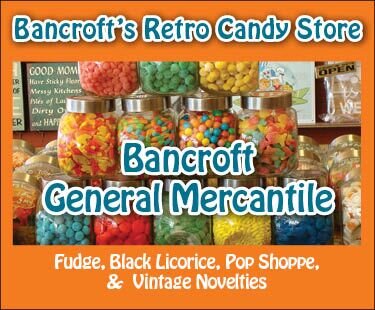Grape Expectations: Potter Settlement Sets a New Gold Standard with Heirloom Vines
/By Michelle Annette Tremblay
Disclaimer: by reading this article you may find yourself sacrificing a tank of gas, a sunny afternoon, and perhaps even an hour or two of sobriety. If you shudder at the thought of fine wine, day-trips, stories of tenacity and toil, overcoming unbeatable odds, family legacies and unwavering passion and commitment, then this story isn't for you. But who are we kidding? Don't we all love stories of grit and gusto? Don't we all enjoy getting a little buzzed on dreamy dreams coming to fruition?
It would be easy to centre this story on the owner of Potter Settlement Artisan Winery, Sandor Johnson, who financed the development of his vineyards with the money he's made throughout his uber-successful 28-year modelling career (you might have seen him in a Donna Karan ad or on All My Children, among other places). It's tempting to focus on Johnson's good looks, world travels, photo shoots with Beyonce, and his double life as a Tweed grape farmer and a jet-set New Yorker. But that's not where the heart of this story is. No, we're going to dig deeper. We're going to excavate, much like Johnson and his father did when preparing their land for the grape vines that grow today on Hastings County's very first winery.
Many varietals were tried before finding the right grapes to thrive at Hastings County's first winery, which is currently open to to the public for tours, wine tastings, and purchases. Photo by Gail Burstyn
The picturesque boutique winery is situated in an especially unique location. Tucked away in the tiny town of Tweed, it sits right on the edge of the stubborn and steadfast mass of precambrian rock we call the Canadian Shield. The land has been in Johnson's family since 1836, through both World Wars and the Great Depression, and has seen incarnations as a homestead, dairy farm and sand quarry. Drive an hour south through rolling hills and green pastures and you'll find yourself in pretty Prince Edward County, an appellation celebrated for its many wineries, antique shops and beaches. But drive an hour north through the hardwood forests of cottage country, and the landscape changes dramatically; you'll find yourself in Bancroft, the mineral capital of Canada, where thousands of geology-loving tourists flock each summer for Canada's largest gem and mineral show.
Wine experts know that the mineral content in soil is one of the main factors that determines the flavour of wine: the greater the mineral content, the more flavourful the vintage. Keeping that in mind, Tweed might seem like an ideal place to grow grapes, what with the Canadian Shield underfoot, and the nation's mineral mecca just to the north. Indeed, the 100-acre property is rich in silver, garnet, tourmaline, pyrite and other minerals including gold. But it's also very cold in the winter.
Upon arrival, you can't miss the hand forged gates of Potter Settlement Artisan Winery in Tweed. Photo by Gail Burstyn
“What are you going to make wine out of, maple syrup?” people chided when Johnson first shared his vision of a Tweed winery almost 20 years ago. They've been chiding ever since. It's too cold, they said. Grapes won't grow in Hastings County, they said. It's too far north. It's too rocky. The winters are too long. The elements are too extreme. The grapes will suffer.
They were right. And they were wrong. The winters are long and cold. The grapes did suffer. But they grew. Eventually. And wouldn't you know, grapes that suffer make fine wine. Damn fine wine. Wine the likes of which you won't taste anywhere else in the world. And not just because of the rare terroir.
“We started with Riesling,” recalls Johnson. “We spent about $20,000 on Riesling and they all died. That was a kick in the pants.”
Finding the right grapes to grow in Tweed was tricky. But luckily Johnson's brother, Robin, is a seasoned wine maker who has worked for well-known wineries including Thirty Bench, Colio, Andres and Columbia Valley. He was part of the first program Brock University created to educate and train world-class oenologists and viticulturists in Canada. Together, the Johnson brothers tried varietal after varietal.
“After all the Riesling vines died I thought, 'Okay, that's not working. Let's try Gruner Veltliner,'” Sandor continues. “I figured we'd stick with the cold varietals, so we tried grapes from Austria and Germany. I got smarter the year after the Riesling and only put about $5000 into it. Only three plants lived. I thought, 'This isn't working at all.'”
After 17 years of experimenting with heritage-heirloom grapes in Hastings County, trailblazing vintner Sandor Johnson is proud to share Potter Settlement Artisan Wines with the public. Photo by Gail Burstyn
But then one day Johnson was casually flipping through the Canadian Wine Atlas and happened upon the page about Quebec heirloom varietals. “I thought, sure, Quebec. It's French,” says Johnson. “Wine is a part of the culture, and there are heritage heirloom grapes like Marechal Foch and St. Croix that grew along the St. Lawrence - and they make wonderful, wonderful wine!”
But even with his vast knowledge and experience, Robin didn't know how to make wine using Quebec heritage grapes. Like so many industries, the wine industry has become increasingly standardized over time. Years ago, unique local varietals were literally pulled up and out of the ground to make space for sure-sellers like Merlot and Cabernet Sauvignon. Whereas there used to be countless varieties of wine, peruse any LCBO outlet today and you'll find wines from all over the world made from the same 50-60 varietals.
“Robin said to me, 'Look, I can make Merlot blindfolded, but I don't know how to make this old French Canadian stuff,'” recounts Johnson as he drives me around the winery in his tour cart, a 737 aircraft tug. He keeps talking as I take photos of the stone retaining wall he built by hand and the 100-foot deep pond where mother geese are teaching their babies to swim. It's the same pond his grandfather used to remind him to be careful around when he was a boy, lest he fall into the chilly depths.
Set on 100 acres, Potter Settlement has its own 100 foot deep pond, forest, and beautiful retaining walls, gardens and outbuildings. Photo by Gail Burstyn
“Robin said, 'No-one knows how. It's lost. No-one uses these grapes anymore. I don't know what kind of barrel to use. I don't know what yeast to use; there are thousands of different kinds. Some make wine fruity. Some make wine spicy. I don't know what yeast to use in conjunction with what barrel.' He said 'I don't know what style of wine to make: is it bitter, sweet, dry? I don't know. I need time!'” Johnson smiles at the memory. “I said, ‘well how much time do you need?’ He told me he needed about a decade to figure it out.”
That was 17 years ago. For 17 years the brothers experimented. They tried different varietals, different barrels, different yeasts, from all over the world, over and over, in various combinations. Johnson continued to work the land, filling in the old sand quarry with his father to make room for a vineyard, dynamiting right through a huge outcrop to create the 'cave' where he ages the wine using thermal mass to maintain the optimal temperature rather than relying on fossil fuels. He learned how to use a back hoe, excavator and bulldozer. He built the gazebo where visitors can sample his wines. He built the winery itself, which is still a work in progress but already impressive, with views of vineyards on all sides. No expense was spared. No rock unturned. And all the while the vintners to the south chuckled.
During tours, winery owner Sandor Johnson explains the art of wine making and what makes his thermal mass 'wine cave' so unique. Photo by Michelle Annette Tremblay
“Everyone was making fun of us,” Johnson admits with no hint of self-consciousness. “’Oh a winery in Tweed,’ they said. ‘What will it be, Chateau au Pine Needles?’” Johnson says the most cutting insult he received was at a meeting for vintners in Prince Edward County.
“I thought they'd be supportive,” he says, shaking his head. “One of the wine makers there asked where I was from, and when I told him I had a winery in Tweed, he asked what types of grapes we were using. I told him heritage heirloom and Quebec varietals, and he said 'ah, that's probably only good enough for the pigs.' And I thought, you know what, you haven't even tried our wine, you don't even know what you're talking about and you're putting us down. It made me feel really bad.”
But he didn't give up. Johnson had a vision. The brothers forged on. They met with Alain Breault of A&M Viticulture in Quebec, who supplied them with French Canadian heritage-heirloom varietals as well as newer cold-hardy varietals developed at the University of Minnesota.
Big dreams just get bigger: Johnson describes future plans for Hasting's first winery, including more construction, landscaping, and hosting weddings and special events. Photo by Michelle Annette Tremblay
“The Marquette varietal, in particular, makes a spectacular wine and has supported a whole northern wine industry in the Americas that was, until recently, nonexistent,” explains the vintner. “Alain worked with Peter Hemstad of the University of Minnesota to develop these grapes. Sommeliers and wine-makers from around the world tasted literally thousands of samples of wines from their grapes before they narrowed it down to the best varietal.
“If it wasn't for the universities, scientists like Peter, botany experts like Alain, and a community of wine-lovers who wanted to create a northern wine industry of exceptional wines from high yielding grapes, my venture would not have been possible.”
Luckily the local community was also supportive. The Tweed municipal council and chamber of commerce embraced Johnson's vision, and county and tourism reps cheered him on, as well as his local member of parliament. The brothers continued experimenting, keeping detailed notes, and ignored the jeers from the vintners to the south.
Situated on the edge of the Canadian Shield, Potter Settlement has a unique mineral terroir and beautiful views. Photo by Gail Burstyn
“I kept my mouth shut for 17 years. I knew that as soon as the wines were available to the public I'd be judged, and I was already facing an avalanche of negativity being the only winery in Hastings County and being the little guy,” says Johnson. “People expected me to fail. They thought it was a big joke.” He shrugged off the negativity but decided not to make anything available to the public until he had perfected it.
Potter Settlement Winery is now open for business with several perfected selections available, including a Frontenac Rouge and a Marquette that is the gold standard at Brock University. Dr. Wendy McFadden, one of the professors of the Cool Climate Oenology and Viticulture Institute (CCOVI) program at Brock visited Potter Settlement and purchased some cases of the Marquette. After trying it she had to get in touch with Johnson.
“She sent me a message to tell me she now uses our Marquette as the gold-standard specifically to show her students that yes, you really can make excellent wine out of cold-resistant varietals in Canada,” says a proud Johnson.
Even though Potter Settlement just corked its first 12,000 bottles available to the public last year, it's already received a positive review from Barack Obama, praise from the CBC and Toronto Star, and has been the top seller at each of the winery exhibitions it's been featured in. But it's not just what's in the wine that makes it so good. It's what's not in the wine.
Potter Settlement currently offers six varieties of artisan wine: Frontenac Rouge, Marquette, Cabernet Franc, Pinot Noir, Vidal Blanc, and Frontenac Gris Late Harvest. Bottles are priced affordably at just $20, except for the Pinot Noir which is $30. Photo by Michelle Annette Tremblay
“I don't use pesticides or herbicides,” reveals Johnson as he leads me into the ground floor of the winery. There, in the corner sits a huge and very expensive mechanical weeder. Potter Settlement is one of the only wineries in the country with such a contraption.
But while he has a high tech weeder on site, you won't find a combine for harvesting the grapes anywhere on Potter Settlement. That's because the vines are pruned and the grapes are picked by hand. And that makes a huge difference in the quality of the wine.
“Out here at Potter Settlement we're hand picking the grapes. I see a bug, I knock it off. I see rot, I cut it off. I wash everything clean, clean, clean. As a little guy I've got an advantage over the big guys: I can make a better quality product,” beams Johnson. “By contrast, the big wineries with 1000 acres are out there with combines; you shake that grape vine and all the grapes fall into the hopper, the ripe grapes, the unripe grapes, the bugs, the frogs, the mice, the dirt...
No big combines or harmful additives here: Johnson says being 'the little guy' in the massive wine market gives him the advantage of being able to offer a superior product. Photo courtesy Potter Settlement Artisan Winery
“The first thing the big wineries for the masses do is add bleach to sterilize,” says Johnson, pausing. “People will say they get a headache from drinking wine. It's because it's heavily sulphated. Then they add sugar, because it's cheap, then vitamins, then artificial tannins to make the wine taste good and also to make it taste the same every time. They want you to be brand loyal, so the wine needs to taste the same all the time.”
But wine shouldn't taste the same all the time. Artisinal wine, without artificial tannins, sulphate and sugar added, tastes different year to year, depending on the length of the growing season, the amount of rain, temperature fluctuations and humidity. Of course relying on the weather for a good harvest doesn't guarantee a profitable bottom line. But Johnson doesn't care. For him it's all about doing something he loves, with great care, and sharing that with friends and family.
Johnson loves sharing his high-end small-batch artisinal wine with visitors to Potter Settlement. Photo by Gail Burstyn
“By inviting you to Potter Settlement, I'm inviting you to my home,” Johnson says earnestly. “I'm inviting you to my people. My family. Their history. Their stories, their struggles and their successes. I'm related by blood to many people here in Tweed in some way, shape or form because we've been in this valley for so long. It's comforting to have family, even distant, surrounding you. It's tight-knit. The kind of community where everyone waves when they drive by you. Where you open the door and look down to see that someone has dropped off a jar of their honey or a carton of fresh eggs. Very different from my life in New York City where you literally don't know who's living in the apartment next to you.”
The artisan vintner hopes to open the winery up as a wedding venue in the future. He has already had requests, but says the grounds aren't quite ready yet. He stretches his arms out and points to the gazebo atop the hill, describing the arbour he'll build, and the roses he'll plant. The winery's tasting area will have a French kitchen and built-in display cases for his private collection of ancient artifacts - everything from dinosaur eggs to Egyptian carvings - that he has built up over the past 30 years. The cave's huge heavy hemlock door that his cousin Kelsey Moore designed will be completed, and eventually Johnson plans to add another heady beverage to his offerings: mead, also known as honey wine. One might think his ideas are too lofty, except he's already proven his critics wrong.
The charming hilltop gazebo at Potter Settlement will remain the temporary wine tasting station until the interior of the large custom winery building at the base of the hill is complete. Johnson says an arbour will be built around the gazebo, complete with hanging grape vines.. Photo by Gail Burstyn
“This took perseverance and grit,” admits Johnson, “which were lessons I learned from my father... and patience and optimism, lessons from my mother. I often think about my now deceased grandparents and great-grandparents, who I loved with my whole heart. I want to do them, my forbearers, and my community proud here. It motivates me deeply. I'll still be doing this when I'm an old man.”
Blood, sweat and tears: Kelsey Moore bangs out embellishments for the heavy wrought iron gates which greets guests as they arrive at Potter Settlement Artisan Winery. Photo courtesy Potter Settlement Artisan Winery
It's a special thing to see someone truly in their element, thriving as they live in accordance to their values. Potter Settlement isn't just about wine. It's about investment, in the least financial sense of the word. Investment in ideals. Investment in history. Investment in quality. And investment in pleasure. If you visit Potter Settlement the first thing you'll see upon arrival are the huge wrought iron gates that Johnson built with the help of his blacksmith cousin Kelsey, who has been integral to many of the artistic designs around the winery. Johnson refers to him as 'the art and soul of Potter Settlement.' The gates were pounded out by hand over the course of a year and a half. The cousins would get together on weekends, fussing over each little detail. They're beautiful. But, weighing in at about 600 pounds each, many people, including a professional gate designer, didn't think they'd ever hang. They were just too big. Too heavy.
“The gates, really, are symbolic of this whole project,” Johnson tells me, as the shadows grow longer across the rows of vines. “As much as people didn't think the grapes would grow here, they didn't think these gates would hang. Even my Dad didn't think they would hang. But Kelsey said, 'I've put more thought into this than anyone,' and I trusted him. So really, the moral of this story is if you believe you can do something, don't let other people convince you that you can't.”
Potter Settlement wines can be purchased on site at 1445 Potter Settlement Road in Tweed. For information about booking a free tour and wine tasting, visit www.PotterSettlementWines.com.

















.jpg)












.png)



